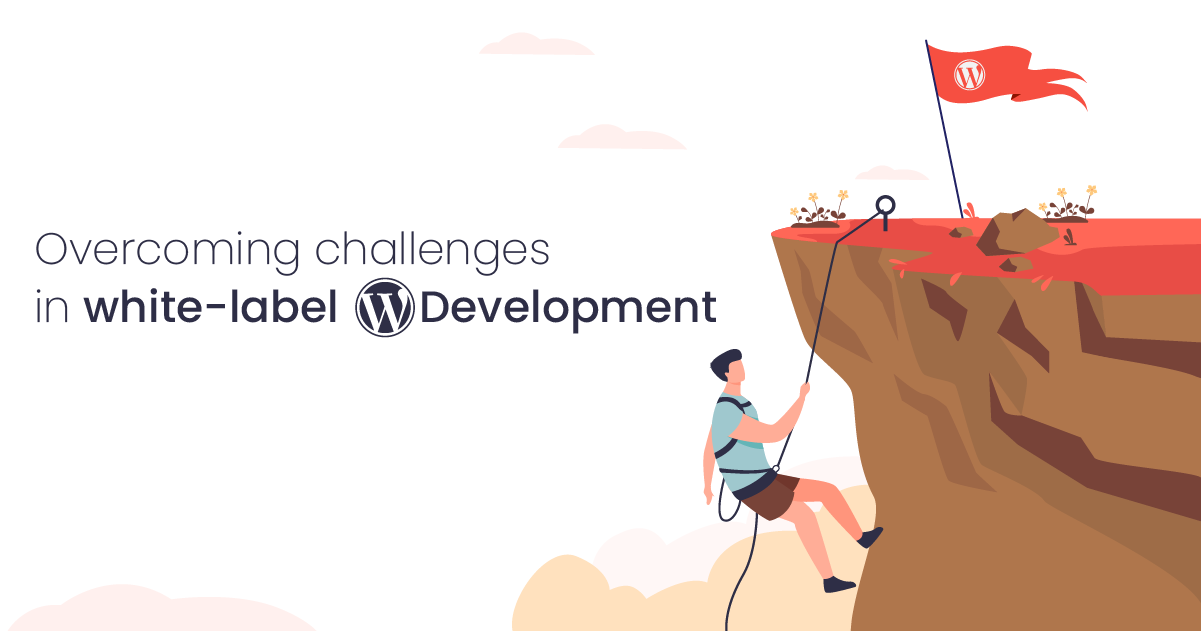
White-label development has advantages, such as lowering development costs and increasing efficiency, but it also poses unique difficulties and challenges that you will inevitably face when starting out. Anyone who’s reached this point probably knows what challenges we’re discussing.
This post aims to highlight the most common challenges in white-label WordPress development and provide solutions for addressing them. We will offer actionable recommendations and best practices for dealing with communication problems, managing time, mitigating risks, and ensuring quality assurance. This post will provide valuable insights and practical advice for managing obstacles in white-label WordPress development, whether you’re an experienced agency owner or just starting out.
White Label WordPress Development Challenges
White-label WordPress development is a great way to scale your agency and differentiate it from the competition. Your success depends entirely on the development agency that provides the services. They must have a solid plan and be able to execute it. However, addressing common issues in white-label WordPress development is essential that come with the territory.
1. Communication challenges.
When working with an outsourced development team, you want to ensure that everyone is on the same page and knows what is expected from them. Not only do you need to communicate your expectations, but also those of your developers if they are not in-house. It may sometimes be difficult to get all your questions answered and clearly understand what needs to be done. You may have to ask repeatedly for clarification, which will delay the project timeline and increase costs.
2. Project planning and execution.
The last thing you want to do is hand over a project without proper planning or preparation and hope it turns out well. Web development projects are time-consuming undertakings that require much more effort than just starting it up and letting things happen as they may; several steps are involved before even getting started on something new. If you don’t plan ahead for each phase of the project and be prepared for any roadblocks along the way, then chances are good that things will not go smoothly or as quickly as anticipated once the project begins.
3. Deployment challenges.
Deploying a new website isn’t as simple as it may seem. If you’re developing something from scratch, there’s the whole process of testing and debugging to deal with; once that’s done, you need to consider how the website will be deployed in its final form. Deployment strategies should be tested in advance of launching your site so that if anything goes wrong, you can roll back to a previous version of your codebase and fix any issues before they become big problems.
White Label WordPress Development Problem Solving
Certainly! When it comes to white-label WordPress development, many challenges can arise, but a number of strategies can be employed to overcome them. Here are some points on how to solve the common challenges in white-label WordPress development:
1. Communication Issues Between The Development Team And Clients.
Clear and consistent communication is essential for successful white-label WordPress development projects. To overcome communication issues, it is important to set clear expectations and goals with clients at the outset of the project.
Also, ensure that everyone who needs access to your project has been briefed on what they’re doing when they’re doing it and how it will help move things along. It’s also essential to make sure that everyone knows what they need to do if a decision is made for the project to move forward successfully. You can also track progress and updates using project management tools.
2. Difficulty In Managing Project Timelines And Deadlines
The project can be divided into smaller, easier-to-manage jobs to manage project timelines and deadlines. This can make it simpler to monitor development and make sure that goals are reached. It’s also crucial to set reasonable goals and timetables. To keep the project on schedule and make sure that everyone is informed of any changes or updates that might have an effect on the timetable, project management tools can be used to monitor progress and deadlines.
3. Maintaining Quality Assurance And Ensuring That The Final Product Meets Client Expectations
White label wordpress development quality assurance is a critical component. It’s crucial to establish a precise set of quality standards and convey them to the development team in order to uphold quality and guarantee that the finished product fulfills client expectations. Potential problems can be discovered early in the production process using automated testing tools. It is possible to guarantee that the finished product meets the necessary standards by conducting regular quality reviews and tests.
4. Managing Risks Associated With Development, Such As Security And Compatibility Issues
White label WordPress development risk management involves several components, such as security and compatibility concerns. To manage these risks, staying up to date with the latest WordPress security best practices is important. Using reputable plugins and themes can also help to reduce the risk of security and compatibility issues. Testing the website on different devices and browsers can help to ensure that it is compatible with a wide range of systems.
A Good White Label Service Can Relieve You Of A Lot Of Stress.
White-label WordPress development can present several challenges, from managing project timelines and ensuring quality assurance to adapting to changing client needs and managing risks. However, with the right strategies in place, these challenges can be overcome. By focusing on clear and consistent communication with clients, breaking projects down into manageable tasks, developing a clear set of quality standards, staying up to date with the latest security best practices, and adopting flexible development processes involved.
To ensure success in this competitive industry, it is crucial to invest time and resources into addressing the common challenges in white-label WordPress development and continually seek to improve the quality and efficiency of the development process.
